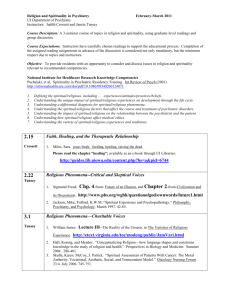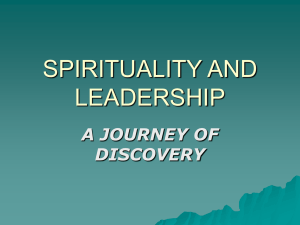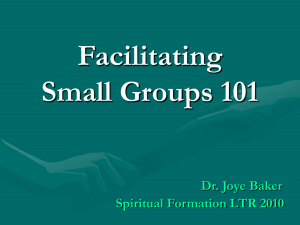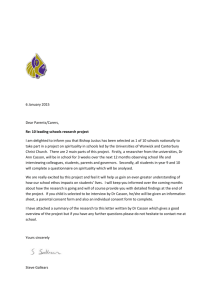Document Conversion Macros - Trinity Western University
advertisement
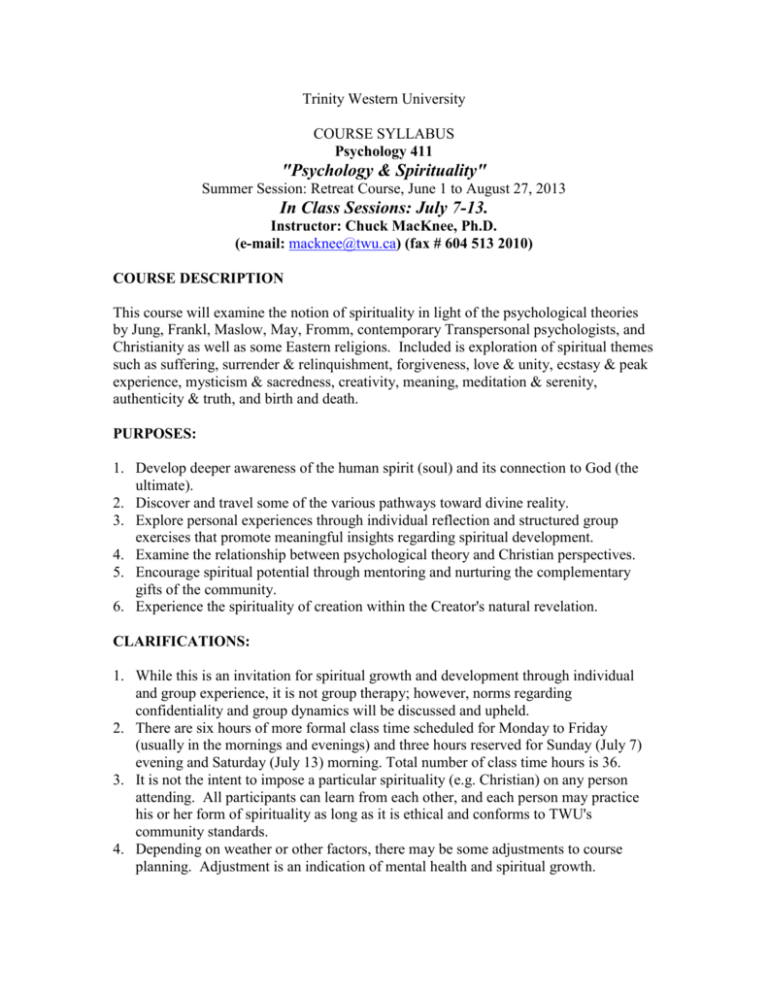
Trinity Western University COURSE SYLLABUS Psychology 411 "Psychology & Spirituality" Summer Session: Retreat Course, June 1 to August 27, 2013 In Class Sessions: July 7-13. Instructor: Chuck MacKnee, Ph.D. (e-mail: macknee@twu.ca) (fax # 604 513 2010) COURSE DESCRIPTION This course will examine the notion of spirituality in light of the psychological theories by Jung, Frankl, Maslow, May, Fromm, contemporary Transpersonal psychologists, and Christianity as well as some Eastern religions. Included is exploration of spiritual themes such as suffering, surrender & relinquishment, forgiveness, love & unity, ecstasy & peak experience, mysticism & sacredness, creativity, meaning, meditation & serenity, authenticity & truth, and birth and death. PURPOSES: 1. Develop deeper awareness of the human spirit (soul) and its connection to God (the ultimate). 2. Discover and travel some of the various pathways toward divine reality. 3. Explore personal experiences through individual reflection and structured group exercises that promote meaningful insights regarding spiritual development. 4. Examine the relationship between psychological theory and Christian perspectives. 5. Encourage spiritual potential through mentoring and nurturing the complementary gifts of the community. 6. Experience the spirituality of creation within the Creator's natural revelation. CLARIFICATIONS: 1. While this is an invitation for spiritual growth and development through individual and group experience, it is not group therapy; however, norms regarding confidentiality and group dynamics will be discussed and upheld. 2. There are six hours of more formal class time scheduled for Monday to Friday (usually in the mornings and evenings) and three hours reserved for Sunday (July 7) evening and Saturday (July 13) morning. Total number of class time hours is 36. 3. It is not the intent to impose a particular spirituality (e.g. Christian) on any person attending. All participants can learn from each other, and each person may practice his or her form of spirituality as long as it is ethical and conforms to TWU's community standards. 4. Depending on weather or other factors, there may be some adjustments to course planning. Adjustment is an indication of mental health and spiritual growth. 5. Because this is a one week in-class retreat course and it is not expected that all class requirements would be completed during that time. The course readings would begin June 1and other projects will be due later in the summer (see Course Requirements). COURSE REQUIREMENTS: 1. Spiritual Journal 20% Ronald Klug's How to Keep a Spiritual Journal is to be read before June 1. From June 1 until July 15, students are required to keep a daily spiritual journal. On July 22 a six page typed paper is due (through e-mail attachments, fax, or hard copy) that evaluates your journalizing. Given that you are in the optimum position to decipher your meaning from this experience, your paper should phenomenologically analyze the themes that emerge from your journal writing. What did you write about most? What issues did you exclude? How are the issues related? What did you learn about yourself, God, and your spiritual values? What do your musings mean to you? (You might use chapter 12 of Klug to help) Grading will be based on how well the thematic issues are articulated and crafted into a meaningful narrative (a story with a beginning, middle, and an end). Interaction with Klug's text will also be a component of the grading criteria. 2. Class Participation 20% Because the course is oriented around group discussion and experience, each member is a worthy contributor and is expected to be involved. Evaluation is based on evidence of required daily readings for discussion, involvement with group exercises, assessment of daily individual assignments (the above evaluation is based on the Course Pak and Peck's The Road Less Traveled), and general contributions through word, deed, and relational edification. While class participation is monitored somewhat subjectively, the daily assignments will be objectively examined each day (thoroughness of completion). 3. Research/integration Paper 25% An eight to ten page paper that demonstrates the integration of Thomas Merton's spiritual themes discussed in Thoughts in Silence with the main character--Father Francis Chisholm--of A. J. Cronin's The Keys of the Kingdom is due August 21. It is recommended that students read Cronin and Merton before the retreat course dates so that relevant issues could be informally discussed with the instructor and classmates. Pay particular attention to Francis Chisholm's psychological and spiritual development by identifying the forces that promoted his growth. Also discuss the meaning(s) of his "inordinate spiritual obstinacy," the benefits and liabilities of tolerance, his "gift of faith," the notion of "different gates to heaven," the implications of "the cows coming home" and fishing. Be aware of the contrasts between Chisholm and his life-long "friend" Anselm Mealey. What does Mealey represent? 4. Final Exam 30% The "final exam" is a take home paper that concisely delineates how one of the psychological theories on spirituality contextually informs your spiritual perspective. Include how the psychological theory would view and explain two the spiritual themes that were discussed throughout the week. Evidence of course pack reading is important. Grading will be based on a) comprehension of basic concepts and issues; b) analysis of the spiritual theme from the theoretical perspective; c) application to life; d) organization and synthesis of your thesis. More information will be given at the retreat. (July due date negotiated at retreat) REQUIRED TEXTS: Cronin, A. J. (1941). The Keys of the Kingdom. Boston, MA: Little, Brown, & Company. Klug, Ronald (1993). How to Keep a Spiritual Journal. Minneapolis, MN: Augsburg Press. Merton, Thomas (1983). Thoughts in Solitude. NY: Farrar, Straus, & Giroux Peck, M. Scott (1978). The Road Less Travelled: A New Psychology of Love, Traditional Values and Spiritual Growth. NY: Simon & Schuster. Course Pak includes selected articles and chapters. This can be purchased just before leaving for the retreat during the last week of June. (Read during retreat) **There is plenty of reading to contemplate. * Begin early. For those of you leaving from Langley, BC we can meet at 9:30 a.m. Sunday, July 7 and car pool up to Spring Lake Ranch. The Ranch is set up like a motel (log cabins) so bedding, food, towels, etc. are provided. There is a lake for swimming and boating, horse back riding, line dancing, hiking, and other out door activities. Bring your personal items and a jacket. If you play a musical instrument that is transportable, bring it along. It will be a connecting and spiritual time in God’s creation. Proposed Course Schedule Sunday, July 7 Eve: Introduction of course (rules of the road) "The Lesson" "Shield Exercise" intro of participants Life is difficult: introduce pain of living Monday, July 8 Morn: Spiritual Homelessness Examine readings on defining spirituality Spiritual Experience Eve: Peck's tools for the road (pp. 1-44) Delay gratification & Accepting Responsibility Tuesday, July 9 Morn: Jung & Frankl readings What is meaning? Truth? Video: Merton; Call to silence & solitude Eve: Peck (44-78) Dedication to reality & Balancing Wednesday, July 10 Morn: Readings from R. May & Fromm "Adventure of Living" & Values exercise Video: Vaniere Eve: Peck (81-155) LOVE & feelings Thursday, July 11 Morn: Readings from G. May, MacKnee Spiritual surrender & forgiveness Faith development "Catch 27" Eve: Peck (185-232) Growth & religion Friday, July 12 Morn: Maslow, MacKnee & transcendence readings Death, resurrection, & bliss; mystery Video: Moyer & Campbell Eve: Peck (233-312) Miracles: Accepting Grace Exercises on death Saturday, July 13 Morn: "Spirituality and human nature" Video: After Death experience" Wrap-up & conclusions & continue our spiritual journeys. Lunch and leave for home.


